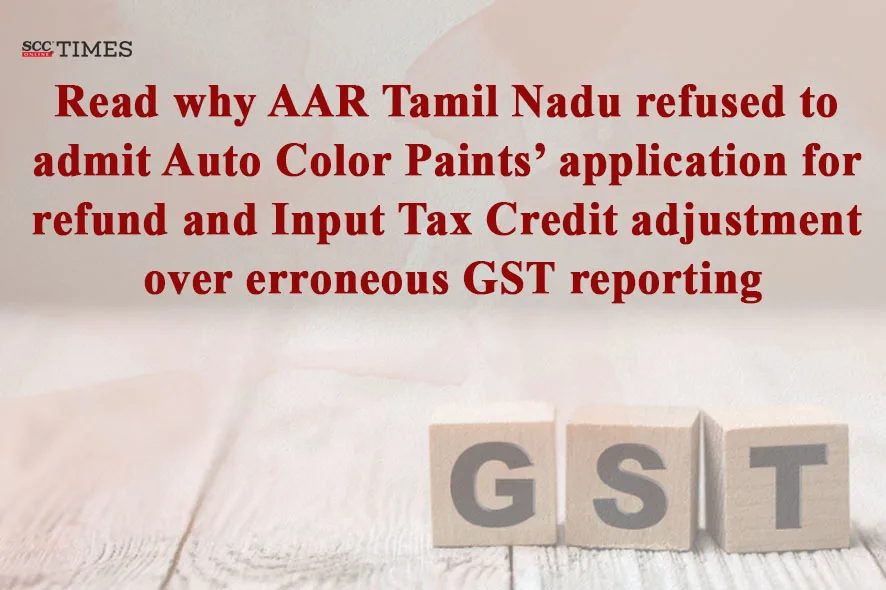Authority for Advance Ruling (AAR), Tamil Nadu: In an application filed by Auto Color Paints, a dealer for PPG Asian Paints, seeking a ruling on adjustment of Input Tax Credit (ITC) and refund of tax erroneously paid due to inadvertent reporting of purchases as sales in their Goods and Sales Tax (GST) returns, the two-Member Bench of C. Thiyagarajan, Member (CGST), and B. Suseel Kumar, Member (SGST), refused to admit the application, holding that the questions raised did not fall under any of the clauses (a) to (g) of Section 97(2) of the Central Goods and Services Tax Act, 2017 (‘CGST Act’) and were therefore outside the scope of advance ruling jurisdiction.
Background
Auto Color Paints, a registered dealer for PPG Asian Paints, was engaged in wholesale and retail trading of paints and related products. During the period from 2017—18 to 2022—23, the applicant inadvertently reported purchase invoices as sales invoices in their GSTR-1 returns and paid output GST on such transactions by mistake. As a result of this clerical error, the ITC legitimately available to the applicant on purchases was effectively reversed or nullified, creating an ITC difference of ₹18,53,429.21 (CGST ₹9,26,714.60 and SGST ₹9,26,714.60). The applicant claimed that there was no actual supply of goods, and that the error occurred solely due to incorrect data entry in GST filings.
To rectify the situation, the applicant requested PPG Asian Paints to modify their books of accounts and adjust the outstanding ITC balance in favour of the applicant. However, the supplier declined the request. Left without internal resolution, the applicant approached the AAR, Tamil Nadu, seeking clarification and relief on two questions – whether such ITC could be adjusted in the books of accounts, and whether the erroneously transferred ITC could be refunded. Accordingly, the matter came before the AAR for determination under Section 97 of the CGST Act.
Issues and Analysis
1. Whether ITC can be adjusted in the books of accounts towards the outstanding payable amount?
At the outset, the AAR noted that the applicant had inadvertently reported purchase invoices as sales invoices in GSTR-1 returns for financial years 2017-18 to 2022-23, thereby paying outward GST and effectively reversing the ITC earlier availed. The applicant contended that since no actual supply of goods had taken place, the ITC should be restored through book adjustment or a direction to the supplier, PPG Asian Paints Ltd., to transmit the outstanding ITC balance.
The AAR observed that, under Section 97(2) of the CGST Act, advance rulings can be sought only on specific questions such as classification, applicability of notifications, determination of time and value of supply, admissibility of ITC, and liability to pay tax, among others. While the applicant’s question referenced ITC, the substance of the request pertained to correction of accounting errors and inter-party adjustments, not to the admissibility of ITC as envisaged under Section 97(2)(d).
The Authority further pointed out that the applicant’s request for issuance of a directive to a third party (the supplier) was outside the jurisdiction of AAR, as per Section 95(a) of the CGST Act, which confines advance rulings to matters relating to supply undertaken or proposed to be undertaken by the applicant. Consequently, the AAR concluded that the issue did not fall within any clause of Section 97(2) and hence could not be admitted for ruling.
2. Whether ITC erroneously transferred will be eligible for refund?
The AAR noted that the second question raised by the applicant, seeking refund of ITC erroneously transferred, clearly fell outside the purview of Section 97(2) of the CGST Act. The provision does not empower AAR to adjudicate refund-related matters or post-transaction rectifications arising from clerical or accounting mistakes.
The AAR emphasized that such corrections or claims must be dealt with under the regular GST mechanism, such as through annual return reconciliation or refund procedures under Section 54, and not through an advance ruling application. Since the applicant’s queries did not involve interpretation of law or determination of tax liability on any supply, they were beyond the statutory scope of advance rulings.
Accordingly, the Authority held that both questions raised were not maintainable under Section 97(2) of the CGST Act and Tamil Nadu Goods and Service Tax Act, 2017.
Accordingly, the AAR dismissed the present application
[Auto Color Paints, In re, 2025 SCC OnLine TN AAR-GST 22, decided on 14-07-2025]
Advocates who appeared in this case :
For the applicant: Mr. Muthukrishnan Shankar, Cost Accountant & Authorised Representative
For the department:


